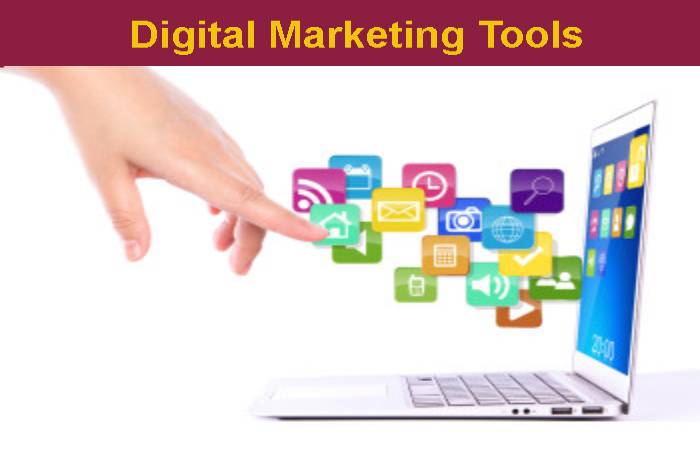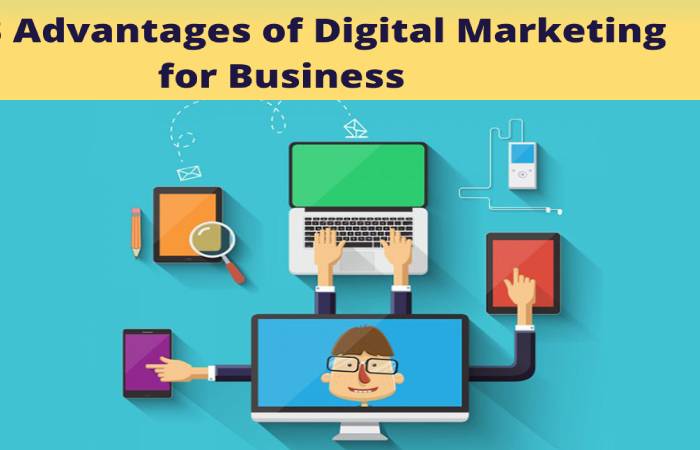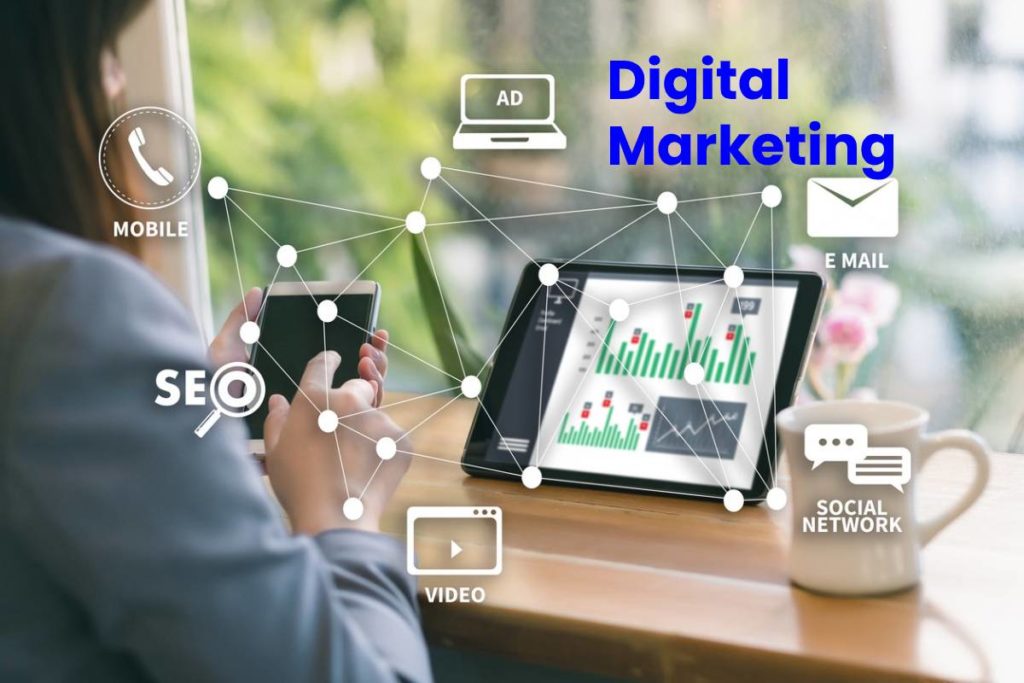Table of Contents
Digital Marketing Definition
Digital marketing is the application of marketing strategies implemented in digital media. All the offline world techniques also imitate and translate into a new world, the online world.
New tools appear in the digital field, such as immediacy, the new networks that emerge every day, and the possibility of real capacities of each of the strategies used.
What Tools are Used for Digital Marketing?

In digital marketing, a wide variety of tools optimize the tasks in our activity’s different areas. We list some of them divided by region:
Web Analytics
Google Analytics, Search Console, Majestic, Google Tag Manager, etc.
Paid Media
Google Ads, MCC, Bing Ads, Facebook Ads, Twitter Ads, etc.
SEO
Moz, OnCrawl, Screaming Frog, Yoast, Ahrefs, Semrush.
Social Media
And also, Hootsuite, Later, Buffer, Bitly, All Hashtag, Storrito, etc
Email Marketing
ClicExperts, MailChimp, etc.
Design
Photoshop, GIPHY, GIMP, Canvas, Unsplash, etc.
IT
WordPress, WpBakery Page Builder, Notepad ++, FileZilla
Reporting
And also, Google Data Studio, Google Spreadsheets, PowerPoint, etc.
CRM
Zoho, Salesforce.
Collaborative Tools
And also, Asana, Trello, Jira, etc.
Advantages of Digital Marketing for Business

As I suppose you may have already realized, Digital Marketing has many advantages that traditional marketing does not have.
It is a safe bet to achieve more significant growth, improve positioning, and expand our communication dissemination.
We are successful in seeing the main advantages of Digital Marketing:
1. Universal Medium
- Digital marketing allows you to take your business anywhere on the planet.
- Never before has the internationalization of the company been so simple and so economical.
- You can position your brand and your products or services without geographical or temporal limitations.
- It doesn’t matter if you run a large corporation or have a small business.
2. Segmentable
- You have enormous possibilities for market segmentation to focus all efforts on the target audience you want to reach (and not on a very high number, as is the case with traditional media).
- An offline marketing strategy does not have many possibilities for segmentation.
- Apart from some decisions like choosing the television channel or radio station and your ad’s time, you cannot do much.
- And also, digital marketing allows you to target people of a certain age, with a specific level of studies, with particular lifestyle habits, and much more.
- The ability to segment the target audience is such that you can carry out differentiated campaigns for each profile.
3. It is Measurable
- It gives you full control over your movements in real-time. If it doesn’t work, you can break any activity without spending the entire budget.
- Think of your last campaign in a traditional medium. How many people did you reach? How many read your ad? Who contacted you thanks to that medium? All these questions are problematic to answer with traditional marketing campaigns.
- With online marketing, you have numerous logical tools that allow you to measure your actions’ success in great detail.
- For example, you will know who enters your website, where they have come from, what sections they have visited, and how long they have stayed on your site.
4. Less Intrusive
- Indeed you obtain more than one telemarketing call that bothers you because it interferes with your activity.
- Digital marketing is not disturbing because users only click on an ad or open an email if they are interested.
- And also, if not, ignore it. Thanks to segmentation, most persons who see your campaigns will have examined something connected to your products or services, so the odds of change are higher.
- And also, without being heavy.
5. Interactive
- Digital Marketing, primarily if you use channels like social networks, allows you to create a public around your brand.
- The message is essential to get to know your clients and your followers.
- Social media marketing is also a unique tool to determine what they think of you and improve your crops or services.
- This direct response with the consumer extends to your customer service section, which will be of high excellence and prompt, with access to the brand 24 hours a day.
6. Cheaper
- The costs much more affordable compared to traditional marketing channels.
- The wide diversity of digital marketing channels and tools lets you choose those strategies that best suit your budget.
- And also content marketing, partner marketing, inbound marketing, social networks, email campaigns.
- And also, SEO positioning are just some examples of plans that you can use to increase your visibility and reputation on the Internet.
- As you can see, it agrees you reach your target audience more cheaply and easily.
- It has virtual channels, tools, and resources to improve a brand’s communication strategy.
- And also, before we say goodbye, we would like to show you this infographic summarizing what we have explained.
Digital Marketing Plan
1. Online World
- The first web 1.0 does not differ from the use of traditional media.
- Its main characteristic is the impossibility of communication and exposure of users.
- And also, only the company has control over what it publishes about itself.
2. Digital World
- With web 2.0, the possibility of sharing information quickly was born thanks to social networks and new information technologies.
- It allows the almost instantaneous exchange of previously impossible pieces, such as videos, graphics, etc.
- And also, internet users search for information and as a community, where there are ongoing relationships and feedback with users from different parts of the world.
- In this new area, the second instance of digital marketing develops since users can freely talk about the brand.
- They have a critical power that before was only allowed to the media: Opinion.
- And also, marketing techniques must then change their paradigm.
- And also, the distributors, media, and producers had the power of opinion. The focus must shift to the user.
- It can search for what it wants thanks to search engines’ power (Google, Yahoo, Bing, etc.).
- Not only ask the given media if its decision is correct, but it also has the possibility of reading reviews, comments, and ratings from other users.
What Does Digital Marketing Agency Do?
1. Measurable Results
- It is the primary and most apparent advantage that digital marketing offers.
- Thanks to multiple analytical tools.
- It also allows you to track your return on investment (ROI) more precisely than traditional marketing.
2. Global Reach
- When we refer to global reach, we mean that, with the internet, we can reach people from anywhere in the world.
3. Immediacy
- And also, digital media allow us to see the results of a campaign in real-time to adjust and optimize it as necessary.
4. Loyalty
- Social networks allow us to generate stronger ties with our clients and build a broader online community than we could in the offline world.
5. Precision in the Target
- While a traditional marketing ad prints to a sizeable undifferentiated audience, we can direct ads to a specific audience.
- And also, thus achieving much more efficient campaigns in digital marketing.
What is the Difference Between Digital and Traditional Marketing?
Traditional marketing has excellent limitations on the segmentation of the target universe. And also, it has enormous difficulties in measuring impact and returns on investment.
Digital marketing, on the other hand, focuses its strategy on the geographic segmentation of the target audience, interests, age, gender, and purchasing power.
Today’s digital marketing allows even micro-segmenting the public by events, such as elections, job changes, birthdays, marriages, births, removals, etc.

